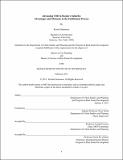Advancing TOD in Boston's suburbs : advantages and obstacles in the entitlement process
Author(s)
Simonson, Kristin (Kristin Andrea)
DownloadFull printable version (2.945Mb)
Alternative title
Advancing transit-oriented development in Boston's suburbs
Other Contributors
Massachusetts Institute of Technology. Center for Real Estate. Program in Real Estate Development.
Advisor
Adjunct Professor Terry Szold.
Terms of use
Metadata
Show full item recordAbstract
This thesis is an inquiry into the feasibility of creating new compact, mixed-use transit-oriented development (TOD) within existing suburbs. I have focused on the entitlement phase of projects, during which land is rezoned, permits are granted and development agreements are struck. Municipalities and developers must work together during this process, and I sought to understand the issues from both sides. For TOD's in Boston's suburbs that have successfully made it through the entitlement phase, what were the most pivotal issues? Pivotal factors can be positive or negative, and either help advance the project or create sticking points. In the case of problematic issues, how were they resolved? To answer these questions, this thesis investigates three case studies: Station Landing in Medford, the Hingham Shipyard in Hingham and Westwood Station in Medford. All three cases had some pivotal issues in common, although resolution varied among cases. Political will, prior zoning and planning done by the municipality, traffic and schools were important factors in every case. Recommendations to planners and developers are as follows: - It's important for both planners and developers to understand the "other side." Working groups are an innovative way to vet issues. - TOD is not for the faint of heart. Projects require vision, leadership and political will. - Experience (especially with similar past projects) matters. - Clear language in the zoning bylaw is crucial. - Predictable mitigation is best. - Planners and developers should look for ways to phase projects and create opportunities for smaller developments. - Transit may not be a necessary ingredient. Flexibility in thinking about TOD and smart growth is vital. Interestingly, while the thesis focuses on TOD, I found that transit was not a critical component for any of the three cases. Therefore, I believe that the findings of this thesis are more broadly applicable to many forms of compact, mixed-use infill development within the suburbs.
Description
Thesis (M.C.P.)--Massachusetts Institute of Technology, Dept. of Urban Studies and Planning; and, (S.M. in Real Estate Development)--Massachusetts Institute of Technology, Program in Real Estate Development in Conjunction with the Center for Real Estate, 2011. Cataloged from PDF version of thesis. Includes bibliographical references (p. 121-128).
Date issued
2011Department
Massachusetts Institute of Technology. Center for Real Estate. Program in Real Estate Development.; Massachusetts Institute of Technology. Center for Real Estate; Massachusetts Institute of Technology. Department of Urban Studies and PlanningPublisher
Massachusetts Institute of Technology
Keywords
Urban Studies and Planning., Center for Real Estate. Program in Real Estate Development.